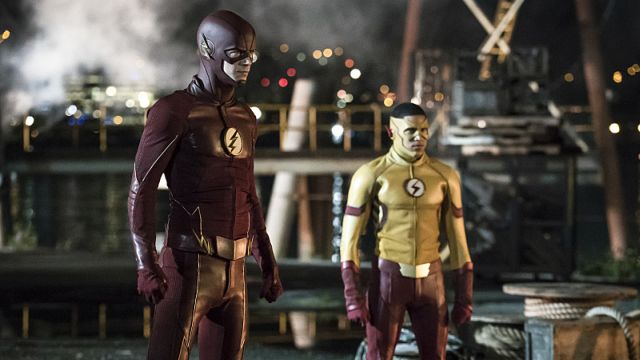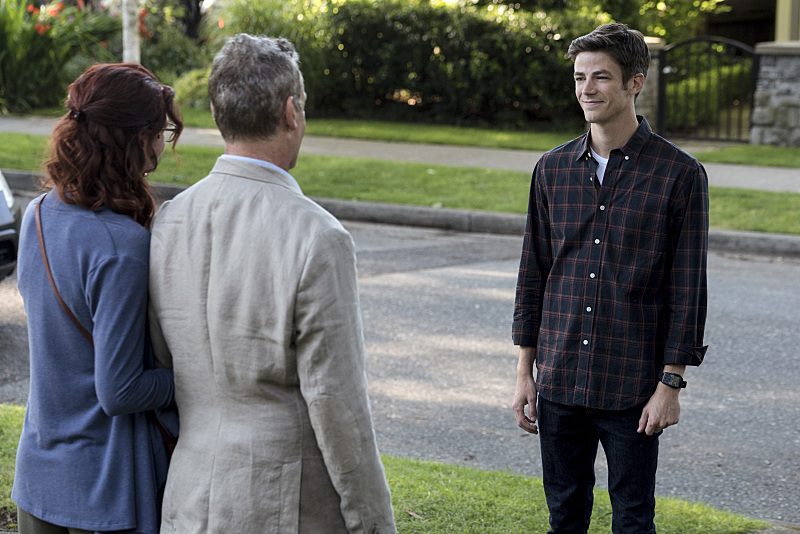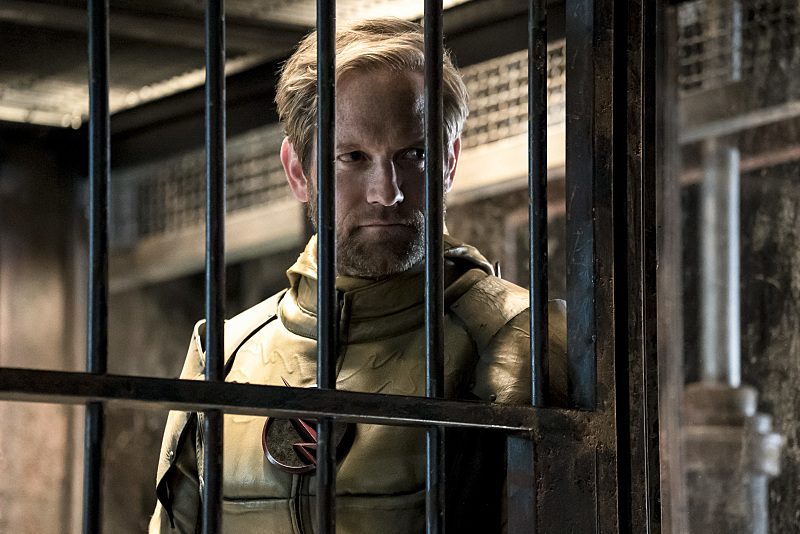The Flash – Flashpoint Review
"It's a Reverse Wonderful Life"
Season 2 of
The Flash concluded with Barry Allen in a literal race against time to prevent Eobard Thawne (aka the Reverse Flash) from murdering Barry’s mother, Nora. Season 3 of
The Flash picks up from where the last season left off, as Barry finds himself in what Thawne terms a “Flashpoint” timeline. For DC Comics fans, “Flashpoint” clearly echoes the themes of the 2011 crossover event of the same name, in which the Flash saves his mother’s life and creates an alternate timeline in the process. One of the key differences between the two storylines is that “Flashpoint,” the Season 3 premiere, isn’t as grim ‘n’ gritty; in fact, some of the characters are doing as well, or better, than they were in the “right” timeline. (I’m sure alternate universe Cisco Ramon, who’s wealthy enough to dress like a Richie Rich cosplayer, would agree.) But events conspire to make Barry realize that the timeline has to be reversed before it “sets like concrete,” to use Thawne’s simile, and becomes permanent.

For the past two seasons,
The Flash has been a fun, and at times inspired, adaptation of the source material. The current batch of Zack Snyder-helmed DC Comics movies, with all of their
sturm und drang excesses, could take some lessons from
The Flash and its expanded CW superhero universe. As portrayed by Grant Gustin, Barry Allen exudes a goodness and clear-eyed optimism that falls just short of cornball. Gustin does a fine job of handling emotional material, like his heart-wrenching farewell to his parents, while also displaying a deft comedic touch during his strained interactions with alternate Iris. The rest of
The Flash cast also has fun playing against type; in particular, Carlos Valdes chews the scenery with gusto as a rich Cisco and Jesse L. Martin gets to play Joe West as something less than a paternal paragon.

Many time travel stories have a tough time working through all of the implications of its premise. Unfortunately, “Flashpoint” is no exception. There are many paradoxes within the plot that the showrunners seemingly never took into account, let alone resolve: for instance, if S.T.A.R. Labs no longer exists in the Flashpoint timeline, then how would the accident occur that would lead to Barry and other metahumans getting their powers? Why would Barry be surprised that Wally is the Flash of this world, let alone recognize him immediately? Also, as mentioned earlier, it seems as if things worked out pretty well for almost all of the characters (save an alcoholic Joe West), so Barry’s conviction that the way to “fix things” is to let Thawne kill Nora isn’t necessarily borne out by the events of the plot. And naturally, as soon as Barry cedes to Thawne’s plan and returns to the present, he finds that Thawne didn’t exactly set things back the way he (and
The Flash audience) remembered them.
“Flashpoint” follows many of the conventions of the standard time travel/alternate universe plotline, mainly by alluding to other works within that genre. For instance, Thawne at one point refers to the Flashpoint timeline as a “Reverse It’s a Wonderful Life.” When Barry receives periodic memory flashes of his previous life, Thawne explains that it’s a sign that Barry’s old life is fading away the longer he stays in the Flashpoint timeline; in many ways, this echoes the plot device in
Back to the Future of having Marty McFly’s family fade away in the Polaroid photo the longer he took reuniting his parents. To its credit, “Flashpoint” didn’t succumb to the cliché of having the alternate universe be so irredeemably awful that changing it is the only logical option. At the same time, the suspension of disbelief required to make Barry want to change it isn’t convincing—in actuality, it makes you question his judgment and leads you to wonder whether he’s the kind of guy who should be given the responsibility of handling such great powers.

In any event, the premiere episode of
The Flash places Barry in the position of having to re-fix the timeline he broke in the first place (and more times than once, at that). Will those fixes make Season 3 of
The Flash worth watching, or will it render it an incomprehensible mess of time paradoxes? To borrow the so-awful-it’s-good pun from the episode: time will tell.
Final Thoughts:
- I didn’t spend much time commenting on The Rival, who is ostensibly the main villain of the episode. I’ll just leave it at this: hopefully he finds a less ridiculous costume and a more interesting codename in the “revised” timeline.
- The Flashpoint event published in DC Comics ultimately led to the New 52, which was a company-wide revamp of its characters. It’ll be interesting to see if the “Flashpoint” episode will have a ripple effect on other CW shows like Arrow and Supergirl. If I had to guess, however, I highly doubt that it will.
- Flashpoint Wally’s alternate origin story of getting hit by a bolt of lightning while driving super fast in a race car was, I have to admit, pretty cool.
- The best line of the episode was a throwaway, but delivered with great comedic timing from Valdes: “My money needs me.”
Pros
- The CW DC superhero universe > the Warner Bros. DC superhero universe
- Winsome performances from Gustin, Patton and the rest of The Flash cast
Cons
- Time-travel paradoxes can go wrong if not careful - can the showrunners deliver?
- Who is the Rival? A better question may be, why should we care?
 For the past two seasons, The Flash has been a fun, and at times inspired, adaptation of the source material. The current batch of Zack Snyder-helmed DC Comics movies, with all of their sturm und drang excesses, could take some lessons from The Flash and its expanded CW superhero universe. As portrayed by Grant Gustin, Barry Allen exudes a goodness and clear-eyed optimism that falls just short of cornball. Gustin does a fine job of handling emotional material, like his heart-wrenching farewell to his parents, while also displaying a deft comedic touch during his strained interactions with alternate Iris. The rest of The Flash cast also has fun playing against type; in particular, Carlos Valdes chews the scenery with gusto as a rich Cisco and Jesse L. Martin gets to play Joe West as something less than a paternal paragon.
For the past two seasons, The Flash has been a fun, and at times inspired, adaptation of the source material. The current batch of Zack Snyder-helmed DC Comics movies, with all of their sturm und drang excesses, could take some lessons from The Flash and its expanded CW superhero universe. As portrayed by Grant Gustin, Barry Allen exudes a goodness and clear-eyed optimism that falls just short of cornball. Gustin does a fine job of handling emotional material, like his heart-wrenching farewell to his parents, while also displaying a deft comedic touch during his strained interactions with alternate Iris. The rest of The Flash cast also has fun playing against type; in particular, Carlos Valdes chews the scenery with gusto as a rich Cisco and Jesse L. Martin gets to play Joe West as something less than a paternal paragon.
 Many time travel stories have a tough time working through all of the implications of its premise. Unfortunately, “Flashpoint” is no exception. There are many paradoxes within the plot that the showrunners seemingly never took into account, let alone resolve: for instance, if S.T.A.R. Labs no longer exists in the Flashpoint timeline, then how would the accident occur that would lead to Barry and other metahumans getting their powers? Why would Barry be surprised that Wally is the Flash of this world, let alone recognize him immediately? Also, as mentioned earlier, it seems as if things worked out pretty well for almost all of the characters (save an alcoholic Joe West), so Barry’s conviction that the way to “fix things” is to let Thawne kill Nora isn’t necessarily borne out by the events of the plot. And naturally, as soon as Barry cedes to Thawne’s plan and returns to the present, he finds that Thawne didn’t exactly set things back the way he (and The Flash audience) remembered them.
“Flashpoint” follows many of the conventions of the standard time travel/alternate universe plotline, mainly by alluding to other works within that genre. For instance, Thawne at one point refers to the Flashpoint timeline as a “Reverse It’s a Wonderful Life.” When Barry receives periodic memory flashes of his previous life, Thawne explains that it’s a sign that Barry’s old life is fading away the longer he stays in the Flashpoint timeline; in many ways, this echoes the plot device in Back to the Future of having Marty McFly’s family fade away in the Polaroid photo the longer he took reuniting his parents. To its credit, “Flashpoint” didn’t succumb to the cliché of having the alternate universe be so irredeemably awful that changing it is the only logical option. At the same time, the suspension of disbelief required to make Barry want to change it isn’t convincing—in actuality, it makes you question his judgment and leads you to wonder whether he’s the kind of guy who should be given the responsibility of handling such great powers.
Many time travel stories have a tough time working through all of the implications of its premise. Unfortunately, “Flashpoint” is no exception. There are many paradoxes within the plot that the showrunners seemingly never took into account, let alone resolve: for instance, if S.T.A.R. Labs no longer exists in the Flashpoint timeline, then how would the accident occur that would lead to Barry and other metahumans getting their powers? Why would Barry be surprised that Wally is the Flash of this world, let alone recognize him immediately? Also, as mentioned earlier, it seems as if things worked out pretty well for almost all of the characters (save an alcoholic Joe West), so Barry’s conviction that the way to “fix things” is to let Thawne kill Nora isn’t necessarily borne out by the events of the plot. And naturally, as soon as Barry cedes to Thawne’s plan and returns to the present, he finds that Thawne didn’t exactly set things back the way he (and The Flash audience) remembered them.
“Flashpoint” follows many of the conventions of the standard time travel/alternate universe plotline, mainly by alluding to other works within that genre. For instance, Thawne at one point refers to the Flashpoint timeline as a “Reverse It’s a Wonderful Life.” When Barry receives periodic memory flashes of his previous life, Thawne explains that it’s a sign that Barry’s old life is fading away the longer he stays in the Flashpoint timeline; in many ways, this echoes the plot device in Back to the Future of having Marty McFly’s family fade away in the Polaroid photo the longer he took reuniting his parents. To its credit, “Flashpoint” didn’t succumb to the cliché of having the alternate universe be so irredeemably awful that changing it is the only logical option. At the same time, the suspension of disbelief required to make Barry want to change it isn’t convincing—in actuality, it makes you question his judgment and leads you to wonder whether he’s the kind of guy who should be given the responsibility of handling such great powers.
 In any event, the premiere episode of The Flash places Barry in the position of having to re-fix the timeline he broke in the first place (and more times than once, at that). Will those fixes make Season 3 of The Flash worth watching, or will it render it an incomprehensible mess of time paradoxes? To borrow the so-awful-it’s-good pun from the episode: time will tell.
Final Thoughts:
In any event, the premiere episode of The Flash places Barry in the position of having to re-fix the timeline he broke in the first place (and more times than once, at that). Will those fixes make Season 3 of The Flash worth watching, or will it render it an incomprehensible mess of time paradoxes? To borrow the so-awful-it’s-good pun from the episode: time will tell.
Final Thoughts: